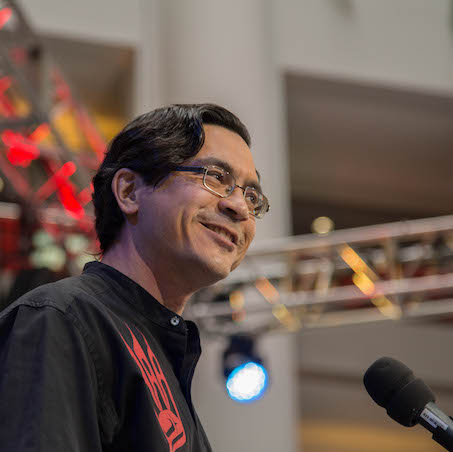Duncan McCue
Host of CBC’s Cross Country Checkup
Bachelor of Arts, 1992; Doctor of Civil Law, 2018
It is important to me to be vocal and assertive about my indigenous identity.
Every Sunday afternoon Duncan McCue walks into a metaphorical corral. It’s actually a CBC Radio studio in Toronto. But Duncan knows he’s in for a ride hosting Cross Country Checkup, a national call-in show.
“I’m on the air live for two hours with a pretty challenging beast of a program,” he says. “There’s only so much research you can do for callers. They are going to throw stuff at you and you just don’t know what’s coming.” Duncan pauses and chuckles. “So two hours live on Checkup is like riding a mustang.”
Duncan grabbed the reins of Cross Country Checkup in the late summer of 2016. And he’s been, not just holding on but, guiding the program. He says, “When we were trying to figure out what this show would be like I thought of one word and that is ‘respect’. It’s not very sexy. I do hope though that over time that is what audiences will grow to understand.”
Respect has been key to much of what Duncan has done in his varied career – respect for his audience, for the stories he tells, for the students he teaches at UBC and Ryerson and respect for his ancestors.
Duncan is Anishinaabe, a member of the Chippewas of Georgina Island First Nation.
“It is important to me to be vocal and assertive about my indigenous identity,” he explains, “because I have to be. We are surrounded by the dominant society every day. There are assimilative pressures every day. I need to assert my indigenous identity every day. When you work within a non-indigenous corporation there is lots of pressure to forget your roots, to forget your voice, to forget where you come from. This is something elders and my family always emphasized to me. This is even more important since I have become a host. I have to remember where I come from.”
His time at King’s played a role, he believes, in learning how to express that.
“I was a bookish nerd in high school. I loved the smallness of King’s and the thoughtful political conversations that we had daily on campus. We talked about some pretty heady stuff. It led to me finding my voice in many ways.”
Along with Checkup, Duncan’s voice is clear and resonant in the documentaries he produces for The National and he is helping a new generation of journalists understand indigenous cultures and politics through a course he developed called Reporting in Indigenous Communities. He flies to Vancouver two or three times a term for intensive sessions with the students. He laughs and says he’s not getting much sleep these days. But what he is doing he knows is vital.
“If you don’t have some sort of cross cultural competency as part of your journalist’s tool box then you will be ill equipped to report on indigenous stories. It is an important public policy issue in this country at the very least and journalists need to have the tools to tell those stories. If they don’t they will just reinforce the stereotypes that have been presented for years and years.”
Duncan thinks about the students who have taken his course and rhymes off a half dozen of the hundred or so across the country. They are journalists in all media who are, as he says, “tackling indigenous issues in a different way.”
With a smile in his voice he adds, “They are my army and I am so proud of them.”
Posted: Jan. 2018
